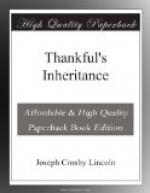When she had calmed sufficiently she told of the interview with her neighbor. E. Holliday had lost no time in stating his position. The High Cliff House, it appeared, was a source of annoyance to him and his. A boarding-house, no matter how genteel or well-conducted a boarding-house it may be, could not longer be tolerated in that situation. The boarders irritated him by trespassing upon his premises, by knocking their tennis balls into his garden beds, by bathing and skylarking on the beach in plain sight from his verandas. And the house and barn interfered with his view. He wished to be perfectly reasonable in the matter; Mrs. Barnes, of course, understood that. He was willing to pay for the privilege of having his own way. But, boiled down and shorn of politeness and subterfuge, his proposition was that Thankful should sell her property to him, after which he would either tear down the buildings on that property, or move them to a less objectionable site.
“But, Auntie,” cried Emily, “of course you told him you didn’t want to sell.”
“Sartin I did. I told him all I had was invested here, that my first season had been a good one considerin’ ’twas the first, and that my prospects were all I had a right to hope for. I told him I was sorry if my boarders had plagued him and I’d try to see they didn’t do so any more. But I couldn’t think of sellin’ out.”
“And what did he say to that?”
“What didn’t he say? What I said didn’t make a bit of difference. He made proclamation that any reasonable price I might name he would consider. He wouldn’t submit to what he called ‘extortion’ of course, but he would be perfectly fair, and all that. I kept sayin’ no and he kept sayin’ yes. Our talk got more and more sultry long towards the last of it. He told me that he made it a p’int to get what he wanted and he was goin’ to get it now. One thing he told me I didn’t know afore, and it’s kind of odd, too. He said the land this house sits on used to belong to him once. His father left it to him. He sold it a long while ago, afore my Uncle Abner bought, I guess. Now he’s sorry he sold.”
“That was queer, what else did he say?”
“Oh, he said a whole lot about his desire to make East Wellmouth his permanent residence, about the taxes he paid, and what he meant to do for the town. I told him that was all right and fine and the town appreciated it, but that I’d got to think of myself; this boardin’-house idea was a life-long ambition of mine and I couldn’t give it up.”
“And how did it end?”
“Just where it begun. His last words to me was that if I wouldn’t listen to reason then he’d have to try other ways. And he warned me that he should try ’em. I said go ahead and try, or words not quite so sassy but meanin’ the same. And out he marched. Oh, Emily, what do you suppose he’ll try? He can’t make me sell out, can he? Oh, dear! Oh, dear! here’s more trouble. And I thought there was enough already!”




